“There is no substitute for rock-solid customer service. You provide it or you don’t. Period!”
Customer service – Do it right, and you can win customers’ hearts, increase sales, and create a positive growth graph for your business.
Going wrong with it can negatively impact your growth.
One of the many things that differentiate excellent customer service from a disappointing one is the customer service channel you use.
Picking the right channels is tricky and challenging. It requires smart decision making by taking into account various factors such as:
- Traffic generated by the channel
- Effectiveness and popularity of the channels you choose
- Customer preferences, and many more.
For your convenience, we have compiled a list of the best customer service channels, stating why they are effective and how you can use them.
7 Effective Support Channels to Improve Customer Service In 2025
If you ask which is the most effective or the best channel for customer service, there is no definite answer to it.
“It depends” is the only sincere answer here.
As mentioned before, there are multiple factors that you need to consider before zeroing in on your customer support channels.
For instance, if some of your customers find email or phone feasible, you will need to tap on these channels to serve them better.
On the contrary, some of your contemporary consumers might prefer a self-service portal or social media to resolve questions. In that case, you can’t miss out on these channels too.
Deciding the customer service channels is personal to your business. There is no set rule for it. You will have to understand your audience, their preferences, and much more to have all the right channels in place.
Read on to discover the most powerful customer service channels that you can consider adopting.
1. Phone Support
Even with new technological advancements, customer service via phone is still dominating the market.
Phones are still widely used by customers to seek help, as proven by American Express research that reveals a whopping 40% of customers prefer talking on the phone to address complicated matters.
Phone help, regardless of how old-fashioned it seems, continues to be a pragmatic solution for most customers, especially baby boomers or those who are just not inclined towards technology.
The reason is simple.
Customers want to talk to a human being who they can hear or see.
Although the world has gone digital, it still can’t replace the help a human being on the other end of the spectrum can provide in real-time.
Example: Having realized the importance of phone support, global firms like Facebook and Google have introduced “Click-to-Call” features, using which customers can instantly call and approach the support staff of a company to get their issues resolved.
2. Email Support
Email-based support is one of the oldest, and there was a time when it was the single most popular channel used by customers to touch base with the support team of a firm.
We’ve come a long way since then, given that customers now have a plethora of options to approach a company.
But despite several advanced options available, it looks like the email system is prominent among a particular set of customers. In an article, Forbes stated that email is the second most popular support channel for baby boomers and the most popular for GenY. This implies –
“The email hasn’t lost its charm completely. It might not be ruling the roost, but it’s definitely at a comfortable spot on the popularity graph.”Tweet this
Example: Zappos, an online shoe and clothing retailer, noted for its unmatched customer service, doesn’t leave any opportunity to surprise and delight its customers. Paul, a representative of the company, handled a customer complaining about a torn shoe, it pretty well by sharing a hilarious and interesting response.
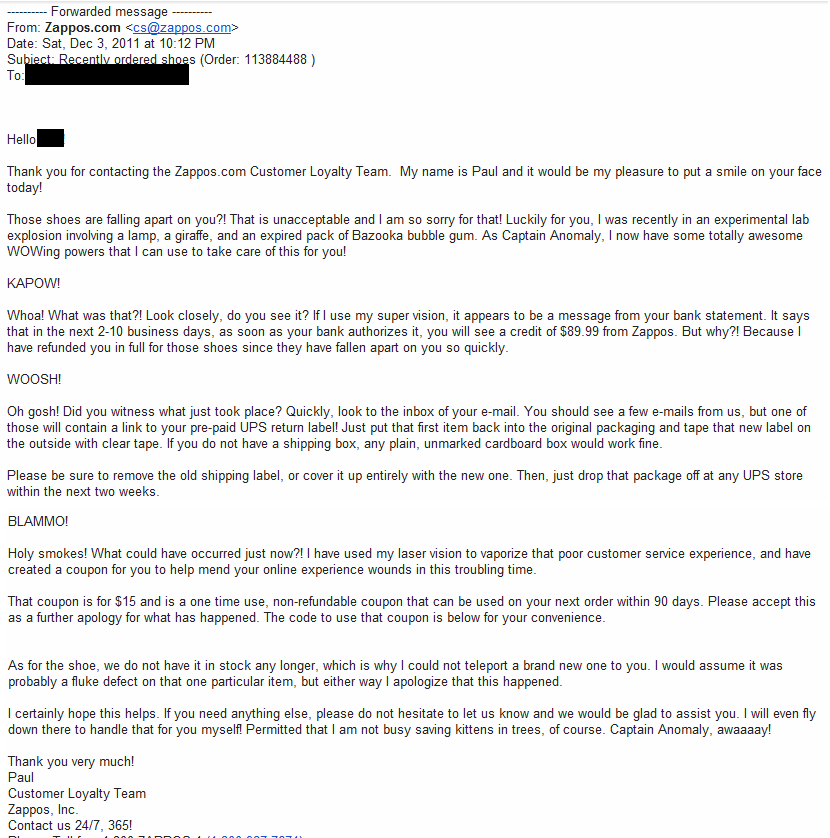 |
|---|
3. Self-Service Platform
For fuss-free, drama-free, and convenient customer support, most organizations today have a self-service knowledge base in place.
Before jumping to how self-service platforms can be useful support channels, let me share what a contemporary customer needs in this digital age.
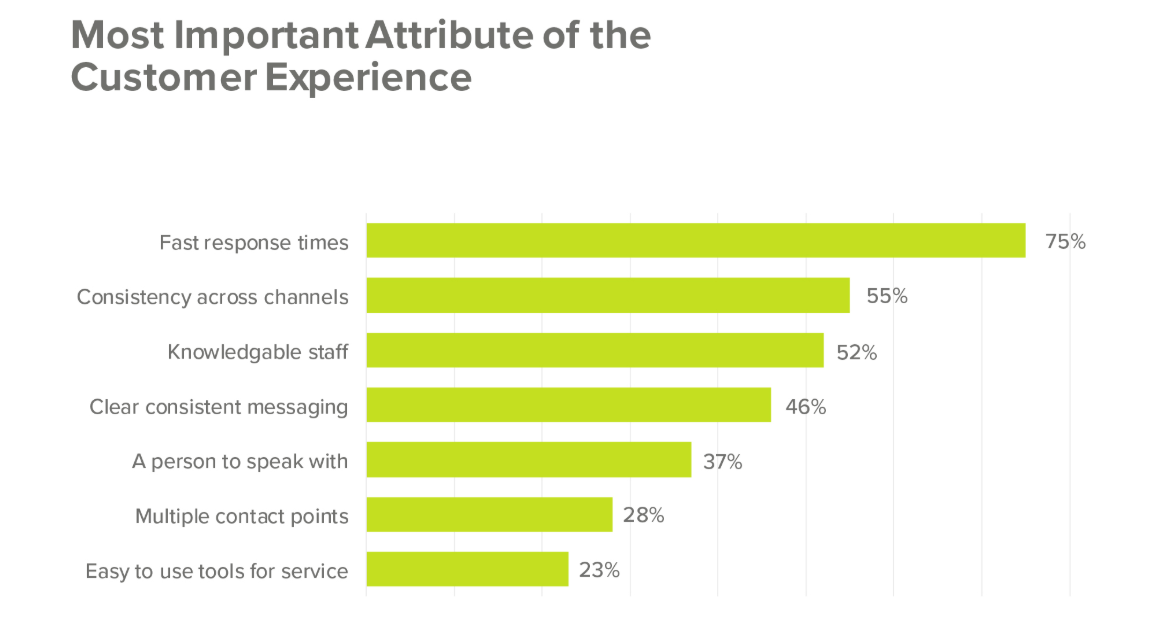
Yes, you heard it right.
For a whopping 75% of customers, it’s ‘speed’ that takes prominence over anything else.
And how can you provide them lightning-fast speed? Take any other channel – phone, social media, or email – nothing can guarantee the fast speed that a self-service help center can deliver.
The reason for this is obvious – there is no involvement of a third party in self-service.
All customers have to do for those questions that have been bothering them is open your self-service knowledge base, type the question or the keyword in the search bar, and relevant articles will come moonwalking on the screen.
It’s as simple as that.
What can be better than customers solving issues on their own? It’s a win-win situation for you and your customers. Here’s why.
- The chance of customers raising a ticket reduces
- Your support staff that’s already buried under a heap of tickets gets a relief, as customers become self-dependent
- Customers are happy and satisfied as they don’t have to wait for hours or days to get minor issues resolved
Want to know how you can take the first step towards adopting self-service?
Watch this video to understand the basics of a self-service knowledge base and how you can create one.
Example: HighQ, a global leader in legal digital transformation, could reduce its support tickets and get a better understanding of its customers’ search behavior, with the help of a centralized self-service knowledge base.
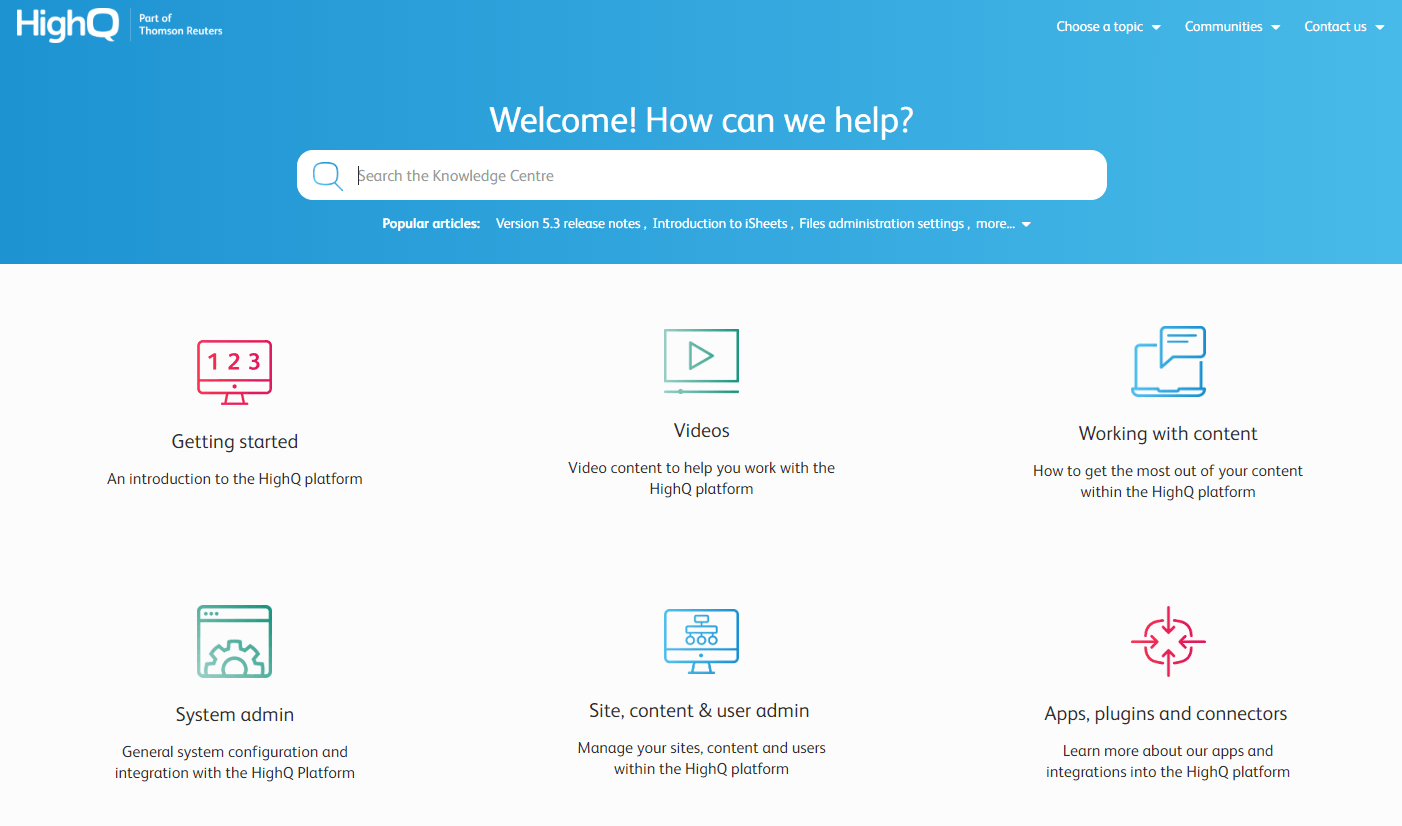 Image Source Image Source |
|---|
HighQ empowered a customer base of 25000 people with self-service support and derived considerable benefits from this move.
For its self-service help center, it says, “Provides a richer interface for our clients to find the info they are looking for.”
4. Live Chat Platform
The first thing that I do if I can’t resolve an issue on a website’s FAQ section is simply typing my query in the chatbox.
I guess this is a natural approach anyone would take.
The next best option if self-help doesn’t work has got to be live chat. You see the chat box popping up, asking you, “Hey, this is XYZ. How can I help you?” and your instant reaction is asking the question then and there.
Adding live chat to your website gives customers near immediate access to your support staff. It’s instant, fast, convenient, and effortless.
Not just customer support, this conversation-based approach opens doors to scores of other opportunities such as –
- Capturing leads
- Engaging with customers proactively
- Growing sales
- Collecting customer feedback and much more.
You’d be surprised to know that live chat is preferred by 79% of businesses to provide instant support to their customers.
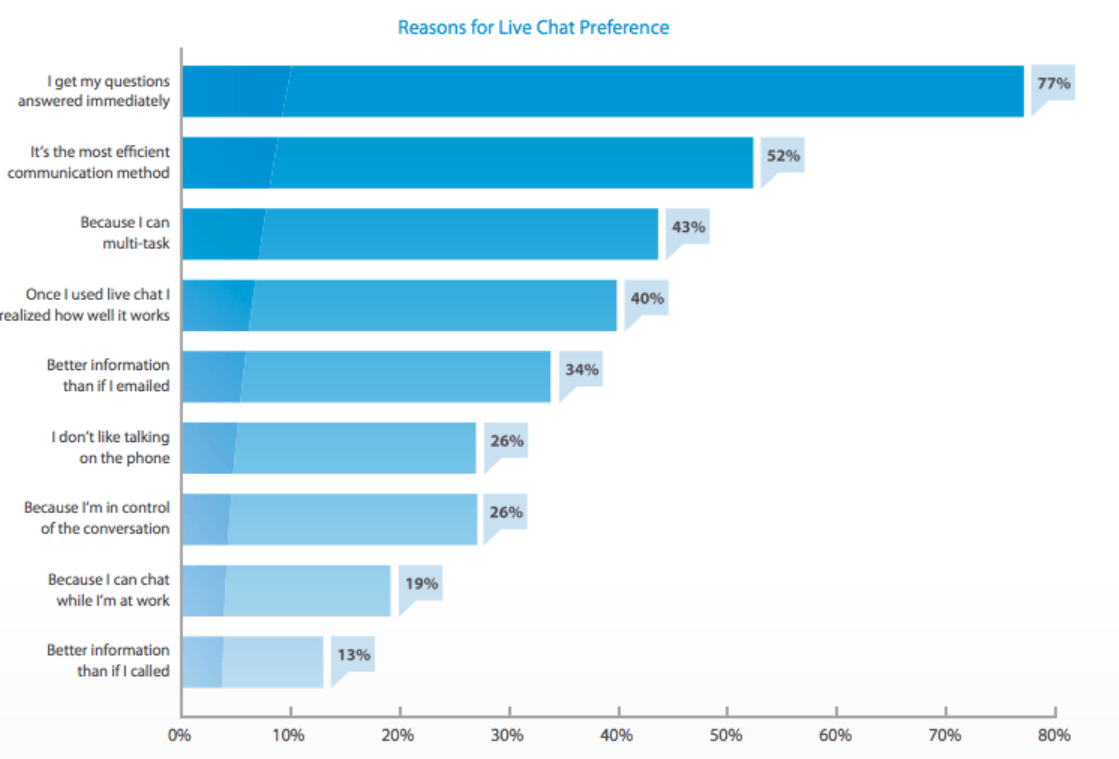
One key reason that this chart misses out on is the human element.
“Live Chat lets you have the best of both worlds – the flexibility of technology and the power of human interaction.”Tweet this
Customers who want to interact with a real human every time they face an issue, but don’t prefer talking on the phone, can instantly message your operators, regardless of whether they are online or offline.
Example: ProProfs uses live chat on its website to provide customers the option to chat with an operator instantly. And like ProProfs, there are various firms across different industries that have live chat installed on their websites to connect and initiate conversations with visitors and solve customer questions. 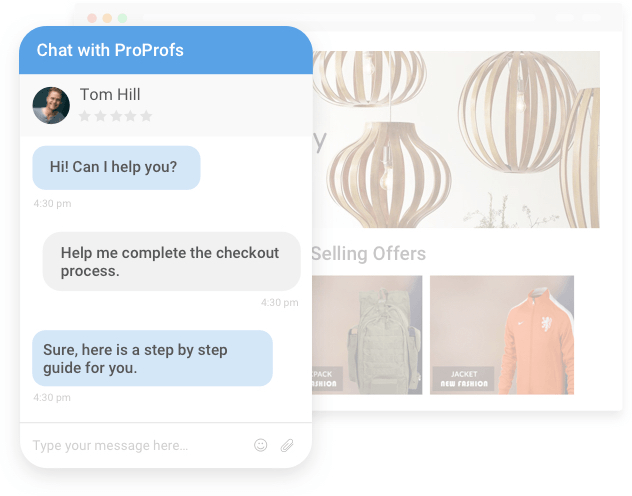 |
|---|
Explore: 6 Benefits of Using a Live Chat on Website (Expert Advice)
5. In-App Help Widget
To take self-help one step ahead, you can group all your popular help site articles in a single widget and add it to your website.
In-app help widget displays on your website with a list of 5 or 6 most-searched articles so that customers don’t have to take the trouble of going to your self-help knowledge base to get what they want. Help is instantly available right on the website.
With the in-app help widget, you can even provide customers the option to chat with operators or call them in case they aren’t satisfied with the self-help experience.
“Self-help, chat help, and phone support, when rolled into one, becomes an in-app help widget. It provides a holistic solution where customers can instantly find answers without going from pillar to post.”Tweet this
Wondering how it works?
Check out this short and silent video on in-app help widget – one of the top customer channels of 2021.
6. Help Desk Ticketing System
Another customer service channel that has become a sheer necessity is ‘Help Desk’.
This doesn’t mean a help desk is a customer’s last resort. It simply suggests that a help desk can be a savior in the most challenging and complicated situations.
Customers can submit a ticket if they feel they aren’t satisfied with their self-help or live chat experience, and still have questions. Once they submit a ticket, agents, on the other hand, start working on them, and reach back to the customer with the resolution.
Depending on the nature of the issue, it can take a few minutes or a few days as well for the agent to get back to the customer.
But, two things this customer service channel promises are –
- increased satisfaction for customers
- streamlined ticket management for agents
While agents can access tickets from a single dashboard and work on them with full focus, customers, on the other hand, love the ease of raising queries that this channel provides.
Explore:Simplify Your Customer Service Experience & Delight Customers with ProProfs Help Desk
7. Social Media Channels
Did you know that the average daily social media usage by internet users is a mind-boggling 144 minutes per day?
No other reason needed for not tapping social media to reach out to customers!
Social media platforms right from Facebook and Twitter to Instagram and LinkedIn give you space where you can interact with your customers in real-time, build relationships, and attain top-of-the-mind brand recall.
This seemingly easy process of reaching out to customers on social media takes considerable effort on your side.
First of all, you need to be an active social media user, post meaningful content regularly, engage with customers by launching campaigns and contests, and always stay on top of industry trends.
Also, stay cautious of how you portray your brand on social media and speak with customers virtually because it’s a space where negative comments can spread like wildfire. One mistake on social media can turn catastrophic for your business, ruining your reputation in the market, and seriously impacting your revenue.
Overall, if you look at it positively, social media provides ample opportunities to connect with customers, address their issues in an instant, and turn them into your brand advocates over time.
Example: Think of social media, and one example that instantly pops up is Starbucks. This coffee-making giant is leveraging social media, especially Instagram, to spread smiles in such distressing times is applause-worthy. Engaging stories, attractive headlines, and visually-appealing posts featuring its employees’ achievements, photos of healthcare workers with a cup of coffee, and even motivational content is simply amazing.
Check out this Instagram post by Starbucks, and you will get a glimpse of how well it’s capitalizing social media to stay connected with coffee-lovers.
This was it. These are the major customer service channels that most businesses know about, but very few can use them optimally.
You might be wondering that each channel is unique in its own way and caters to a specific set of customers, so what should be done in such a case.
An omnichannel approach always works.
Let’s figure out how.
Omni Channel Approach – The Magic Potion to Serve a Diverse Customer-Base
“Putting all your eggs in one basket is old school. The new school approach is – diversification.”Tweet this
The more you diversify, the less risk you face.
As a company, your focus should be to craft a strategy of customer service channels that enable you to enhance your presence on all channels, especially the ones discussed above. But, while doing so, ensure that your communication remains consistent across all the channels.
A company that has set a gold standard as far as omnichannel customer service is concerned is IKEA.
An engaging eCommerce platform, a mobile app that its customers love, a strong offline presence, a seamless online customer service experience, and its adoption of VR technology for buyers to visualize the products while browsing online – says it all.
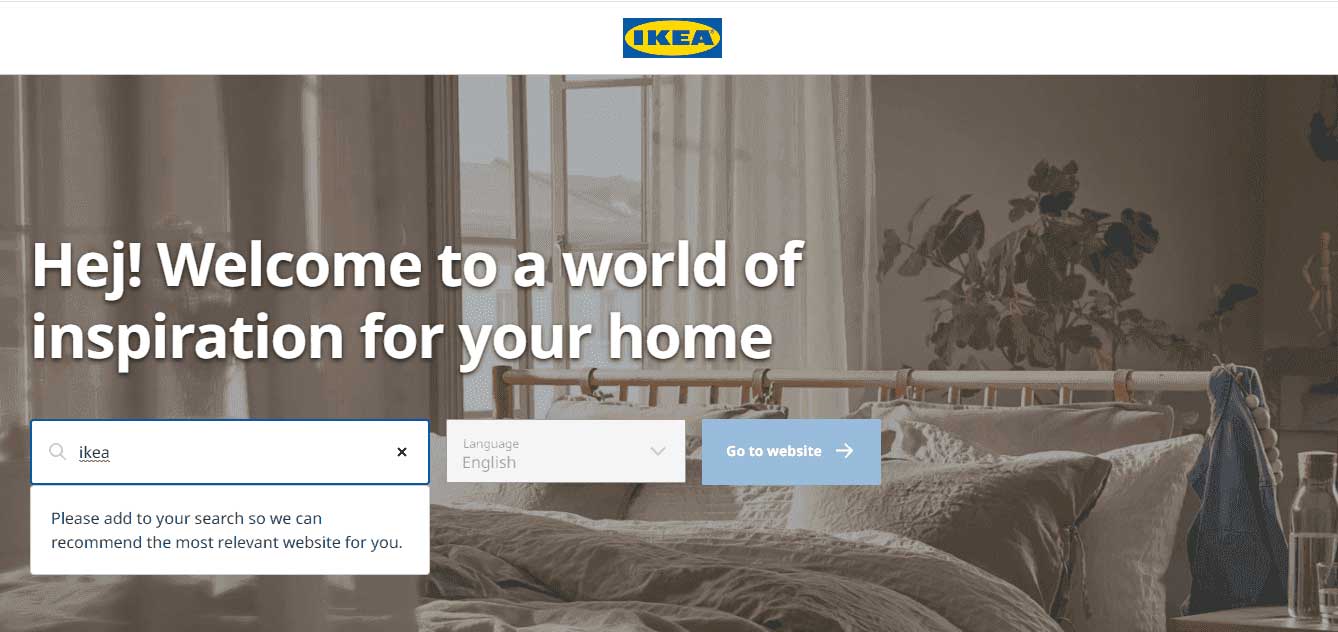
What if you follow suit and invest heavily in adopting an omnichannel approach? What next, if you may ask.
A unified, consistent experience across all channels promises:
- Customer retention
- Revenue jump
- Consistent growth
According to a research by the Aberdeen Group, companies nailing omnichannel customer service experience are able to retain 89% of their customers, whereas those that don’t manage to keep only 33% of their customer base intact.
Explains why having an active presence on all channels can be a game-changing approach for your business, a magic potion that can turn all cards in your favor.
Are you ready to take the plunge?
FREE. All Features. FOREVER!
Try our Forever FREE account with all premium features!








